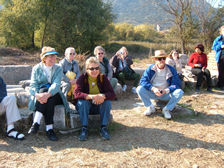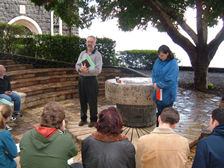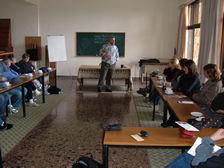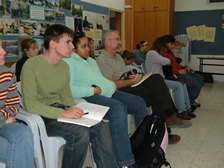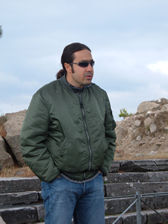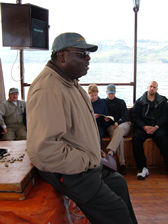
Newsletter 15 June 2008
Time for a New Paradigm
The Rev. Peter J. Miano
continued
from previous page
I believe that as conscientious Christians, we have an obligation to examine
such biblical texts and admit that their moral values are not harmonious with
our own. At the very least, such an admission should mitigate against their
being applied with wooden literalism. It might even open us up to new and
deeper readings of God's Word. Maybe God is scratching her head about such
texts as much as I am. Surely the God we worship has higher moral standards
than the Geneva Conventions.
Biblical scholarship needs reforming and the mission of The Society for Biblical
Studies is exigent, because the dominant paradigm for biblical study and teaching
is neither accessible, relevant nor useful to those who populate the pews
of churches across America, to say nothing of those who stand in the pulpits.
Moreover, the dominant paradigm has acquiesced in the face of the wholesale
abuse of the Bible. S.B.S. offers an alternative. Rather than relying on the
study of texts to glean insight into the Bible, we invite our participants
to engage the Bible in specific contexts. Rather than invite our travelers
to avoid personal involvement, we ask them to risk identifying with those
who suffer, to open their hearts to the suffering of others and then turn
to the pages of scripture. Indeed, in my humble opinion, the beginning of
Bible study is a broken heart. Rather than encourage withdrawal from the world
to the study or the classroom or the library, we insist on immersing ourselves
in the world. Feeling the moral challenges resident around us, we ask different
questions about the Bible. When we are cloistered away in the comfort of our
studies, we might find fascinating the textual variations of the long ending
of Mark. When we sit in the middle of a refuge camp or at a checkpoint, when
we see a home being bulldozed or a 400 mile wall under construction, textual
criticism seems sadly uninteresting. Instead of asking about sources and redactors,
we might ask instead, what does this Bible say about our moral obligation
to combat injustice or systems of oppression? When we immerse ourselves in
a context in which the Bible is used to legitimate warfare or colonization,
we find ourselves asking how do we know that this ancient document is applicable
to us today?
We call it contextual study, but by this we don't mean merely the study of
the ancient contexts in which the biblical narratives were formed. Contextual
study is study of the Bible in a contemporary context. An S.B.S. travel program
is distinctly different from a choreographed, sanitized commercial tour in
that we endeavor to engage the moral challenges of the places through which
we travel. We do this, not merely because it is fascinating, but more importantly
because if we do not, we cannot impart to our participants the realization
that the biblical faith is relevant to our world and that the ethical mandates
of the Gospel faith are still redemptive imperatives today.
In my experience, nothing deepens personal faith more than learning and relearning
that the biblical faith is spiritually redemptive only when it is socially
responsible. There is no personal relationship with the risen Christ that
does not also imply social obligations. For some, spirituality is naively
associated with withdrawal from the world, as if seclusion and solitude are
the ultimate ends of the spiritual person. But none of the historical icons
of spirituality, from the desert mothers and fathers to Thomas Merton and
Mother Theresa remained cloistered in their cells. On the contrary, their
quietude equipped them with the fortitude to engage ministries of compassion
and justice. Want to know another test of the authenticity of spirituality?
Ask yourself what you are doing with it.
It is an error, conditioned by the political climate of America, that induces
us to look for human rights in scripture. The phrase human rights does not
occur anywhere in the Bible. Instead, we find human obligations to address
the social, moral and political challenges of our day, just as Jesus did in
his. Biblical study should lead to inspired action in and for the world. An
academy-or a Church-that studies the Bible to find a basis for entitlement
is an academy-and a Church-that is in need of reform.
